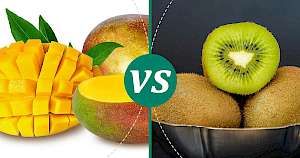Kiwi vs Mango: Nutrition & Calories Compare


Kiwi vs Mango
Nutrition Facts
Serving size:
change
5g10g15g20g30g40g50g60g80g100g120g140g160g180g200g220g250g300g350g400g450g500g600g700g800g900g1000g
1oz2oz3oz4oz5oz6oz7oz8oz10oz12oz15oz20oz25oz30oz35oz40oz50oz
Amount Per Serving:
Serving size:
change
5g10g15g20g30g40g50g60g80g100g120g140g160g180g200g220g250g300g350g400g450g500g600g700g800g900g1000g
1oz2oz3oz4oz5oz6oz7oz8oz10oz12oz15oz20oz25oz30oz35oz40oz50oz
Amount Per Serving:
Kiwi vs Mango 100g Compare
| per 100g | Kiwi | Mango |
|---|---|---|
| Calories | 61 | 78 |
| Carbohydrates | 14.66 g | 17.4 g |
| Fat | 0.52 g | 0.68 g |
| Dietary fiber | 3 g | 1.29 g |
| Protein | 1 g | 0.69 g |
| Calcium | 34 mg | 10.02 mg |
| Magnessium | 17 mg | 10.57 mg |
| Potassium | 312 mg | 204.4 mg |
| Zink | 0.14 mg | 0.563 mg |
| Vitaminium A | 87 µg | 1082 µg |
| Vitaminium B1 (Thiamine) | 0.027 mg | 0.028 mg |
| Vitaminium B2 (riboflavin) | 0.025 mg | 0.038 mg |
| Vitaminium B3 (Niacin) | 0.341 mg | 0.669 mg |
| Vitaminium B9 (Folic acid) | 25 mg | 0.043 mg |
| Vitaminium C | 92.7 mg | 168.1 mg |
| Vitaminium E | 1.46 mg | 0.9 mg |
| Vitaminium K | 40.3 µg | 0.004 µg |
| Beta karoten | 52 mg | 17 mg |
Exploring the Tropical Delights: Kiwi and Mango
When it comes to tropical fruits, kiwi and mango stand out not only for their unique flavors but also for their vibrant colors and health benefits. Both fruits are celebrated for their nutritional content and have become favorites among health enthusiasts and culinary experts alike. But how do these two fruits compare when it comes to their nutritional value? Let's dive into the world of kiwi and mango to discover more about what each fruit has to offer.
A Closer Look at Kiwi
Kiwi, with its bright green flesh and tiny black seeds, is not only visually appealing but also packed with nutrients. This small fruit is known for its high vitamin C content, which surpasses that of oranges, making it an excellent choice for boosting the immune system. Additionally, kiwi is a good source of dietary fiber, which aids in digestion and promotes heart health. With only 61 calories per 100 grams, kiwi is a low-calorie option for those looking to maintain or lose weight.
Mango: The King of Fruits
Mango, often referred to as the king of fruits, is beloved for its sweet, juicy flesh and versatility in culinary applications. This tropical delight is not only rich in taste but also in nutrients. Mangoes are a great source of vitamins A and C, making them beneficial for eye health and immunity. Despite being slightly higher in calories than kiwi, with 70 calories per 100 grams, mangoes offer a substantial nutritional profile that includes fiber, vitamins, and antioxidants.
Nutritional Face-Off
When comparing the nutritional content of kiwi and mango, it's clear that both fruits have their unique advantages. Kiwi stands out for its exceptional vitamin C content, offering 92.7 mg per 100 grams, which is significantly higher than mango's 27.7 mg. Additionally, kiwi provides more dietary fiber, with 3 g per 100 grams compared to mango's 1.8 g, making it a better option for digestive health.
Mango, on the other hand, shines in the vitamin A department, boasting 765 IU per 100 grams, which is essential for good vision and skin health. It also provides a higher content of vitamin E and vitamin B6, contributing to its antioxidant properties and role in brain health.
Both fruits are low in fat and cholesterol-free, making them heart-healthy choices. Kiwi, however, offers more minerals such as calcium, magnesium, and potassium, which are vital for bone health, muscle function, and blood pressure regulation.
Which One to Choose?
Ultimately, the choice between kiwi and mango comes down to personal preference and specific dietary needs. For those looking to boost their vitamin C intake and fiber consumption, kiwi might be the better choice. However, if you're after a fruit that's rich in vitamin A and adds a tropical flair to your dishes, mango is the way to go.
Regardless of your preference, incorporating a variety of fruits, including kiwi and mango, into your diet is a great way to ensure you're getting a wide range of nutrients. Both fruits offer unique flavors and health benefits that can enhance your overall well-being and bring a taste of the tropics to your table.
Kiwi 100g
61kcalCalories source
- 87% CARBS.
- 6% PROTEIN
- 7% FAT
Mango 100g
78kcalCalories source
- 89% CARBS
- 4% PROTEIN
- 8% FAT
Compares of kiwi
- Kiwi vs Apple
- Kiwi vs Apricot
- Kiwi vs Avocado
- Kiwi vs Banana
- Kiwi vs Blackberry
- Kiwi vs Blueberries
- see all compares of kiwi
Marcin Piotrowicz
calories-info.com creator
Healthy diet and healthy lifestyle promoter
Add comment